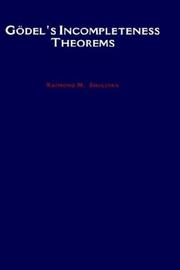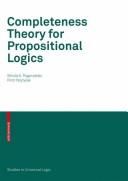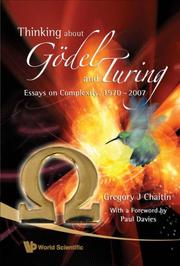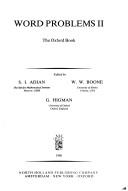| Listing 1 - 10 of 15 | << page >> |
Sort by
|
Book
ISBN: 3030703541 3030703533 Year: 2021 Publisher: Cham, Switzerland : Springer,
Abstract | Keywords | Export | Availability | Bookmark
 Loading...
Loading...Choose an application
- Reference Manager
- EndNote
- RefWorks (Direct export to RefWorks)

ISBN: 0197560032 1280439823 9786610439829 1423735196 0195364376 160129641X 9781423735199 9781601296412 9780195046724 0195046722 0195046722 9781280439827 6610439826 9780195364378 0190281448 Year: 1992 Publisher: New York Oxford University Press
Abstract | Keywords | Export | Availability | Bookmark
 Loading...
Loading...Choose an application
- Reference Manager
- EndNote
- RefWorks (Direct export to RefWorks)
Kurt GoÌdel, the greatest logician of our time, startled the world of mathematics in 1931 with his Theorem of Undecidability, which showed that some statements in mathematics are inherently 'undecidable.' His work on the completeness of logic, the incompleteness of number theory, and the consistency of the axiom of choice and the continuum theory brought him further worldwide fame. In this introductory volume, Raymond Smullyan, himself a well-known logician, guides the reader through the fascinating world of GoÌdel's incompleteness theorems. The level of presentation is suitable for anyone with a basic acquaintance with mathematical logic. As a clear, concise introduction to a difficult but essential subject, the text will appeal to mathematicians, philosophers, and computer scientists.
GoÌdel's theorem. --- Gödel's theorem. --- Gödel, Kurt. --- Gödel's incompleteness theorem --- Undecidable theories --- Arithmetic --- Completeness theorem --- Incompleteness theorems --- Logic, Symbolic and mathematical --- Number theory --- Decidability (Mathematical logic) --- Foundations --- Gkentel, Kourt --- גדל
Book
ISBN: 2919448439 Year: 2021 Publisher: Paris : e-Spania Books,
Abstract | Keywords | Export | Availability | Bookmark
 Loading...
Loading...Choose an application
- Reference Manager
- EndNote
- RefWorks (Direct export to RefWorks)
Villalón wrote one of the first complete grammars of Castilian in 1558. He contributed to the description and codification of Castilian, as well as to the invention of a metalanguage specific to Castilian. The present study retraces in six chapters the sinuous trajectory of the first grammarians of the Romance languages, focusing on Villalón's grammar and linking it to that of Nebrija. It aims to shed light on the modalities of standardisation and metalinguistic description of Castilian, based on the notions of linguistic awareness, norm, sentence, article and completeness.
Language & Linguistics (General) --- grammar --- Renaissance --- romance languages --- standardisation --- codification --- metalanguage --- norm --- sentence --- article --- completeness --- Renacimiento --- gramática --- lenguas románicas --- estandardización --- codificación --- metalenguaje --- norma --- oración --- artículo --- completud --- grammaire --- langues romanes --- norme --- phrase --- métalangage --- complétude --- linguistics

ISBN: 1281378631 9786611378639 3764385189 3764385170 Year: 2008 Publisher: Basel ; Boston : Birkhäuser,
Abstract | Keywords | Export | Availability | Bookmark
 Loading...
Loading...Choose an application
- Reference Manager
- EndNote
- RefWorks (Direct export to RefWorks)
Completeness is one of the most important notions in logic and the foundations of mathematics. Many variants of the notion have been de?ned in literature. We shallconcentrateonthesevariants,andaspects,of completenesswhicharede?ned in propositional logic. Completeness means the possibility of getting all correct and reliable sc- mata of inference by use of logical methods. The word ‘all’, seemingly neutral, is here a crucial point of distinction. Assuming the de?nition as given by E. Post we get, say, a global notion of completeness in which the reliability refers only to syntactic means of logic and outside the correct schemata of inference there are only inconsistent ones. It is impossible, however, to leave aside local aspects of the notion when we want to make it relative to some given or invented notion of truth. Completeness understood in this sense is the adequacy of logic in relation to some semantics, and the change of the logic is accompanied by the change of its semantics. Such completeness was e?ectively used by J. ?ukasiewicz and investigated in general terms by A. Tarski and A. Lindenbaum, which gave strong foundations for research in logic and, in particular, for the notion of consequence operation determined by a logical system. The choice of logical means, by use of which we intend to represent logical inferences, is also important. Most of the de?nitions and results in completeness theory were originally developed in terms of propositional logic. Propositional formal systems ?nd many applications in logic and theoretical computer science.
Mathematics. --- Mathematical logic. --- Mathematical Logic and Foundations. --- Algebra of logic --- Logic, Universal --- Mathematical logic --- Symbolic and mathematical logic --- Symbolic logic --- Mathematics --- Algebra, Abstract --- Metamathematics --- Set theory --- Syllogism --- Math --- Science --- Completeness theorem. --- Logic, Symbolic and mathematical --- Model theory --- Logic, Symbolic and mathematical.

ISBN: 058513362X 9780585133621 9780195351385 019535138X 0198518900 0198503784 9780198518907 9780198503781 9780195130829 0195130820 1280833165 9786610833160 0191523380 0197732356 Year: 1998 Publisher: Oxford: Oxford university press,
Abstract | Keywords | Export | Availability | Bookmark
 Loading...
Loading...Choose an application
- Reference Manager
- EndNote
- RefWorks (Direct export to RefWorks)
In 'Impossibility', John D. Barrow - one of our most elegant and accomplished science writers - argues convincingly that there are limits to human discovery, that there are things that are ultimately unknowable, undoable, or unreachable. Barrow first examines the limits of the human mind: our brain evolved to meet the demands of our immediate environment, and much that lies outside this small circle may also lie outside our understanding. He investigates practical impossibilities, such as those imposed by complexity, uncomputability, or the finiteness of time, space, and resources. Is the universe finite or infinite? Can information be transmitted faster than the speed of light? The book also examines deeper theoretical restrictions on our ability to know, including Gödel's theorem, which proved that there were things that could not be proved.
Science --- Limit (Logic) --- Gödel's theorem. --- Gèodel's theorem --- Sciences - General --- Physical Sciences & Mathematics --- Normal science --- Philosophy of science --- Logic --- Gödel's incompleteness theorem --- Undecidable theories --- Arithmetic --- Completeness theorem --- Incompleteness theorems --- Logic, Symbolic and mathematical --- Number theory --- Decidability (Mathematical logic) --- Philosophy. --- Philosophy --- Foundations --- Go ̈del's theorem. --- Limit (Logic). --- Science. --- Science - Philosophy --- Godel's theorem --- Gödel's theorem. --- Godel's theorem.

ISBN: 1281918679 9786611918675 9812708979 9789812708977 9789812708960 9812708960 9789812708953 9812708952 Year: 2007 Publisher: Singapore ; Hackensack, NJ : World Scientific,
Abstract | Keywords | Export | Availability | Bookmark
 Loading...
Loading...Choose an application
- Reference Manager
- EndNote
- RefWorks (Direct export to RefWorks)
Dr Gregory Chaitin, one of the world's leading mathematicians, is best known for his discovery of the remarkable O number, a concrete example of irreducible complexity in pure mathematics which shows that mathematics is infinitely complex. In this volume, Chaitin discusses the evolution of these ideas, tracing them back to Leibniz and Borel as well as Gödel and Turing.This book contains 23 non-technical papers by Chaitin, his favorite tutorial and survey papers, including Chaitin's three Scientific American articles. These essays summarize a lifetime effort to use the notion of program-size co
Godel's theorem. --- Incompleteness theorems. --- Logic, Symbolic and mathematical. --- Metamathematics. --- Computational complexity. --- Algebra of logic --- Logic, Universal --- Mathematical logic --- Symbolic and mathematical logic --- Symbolic logic --- Mathematics --- Algebra, Abstract --- Metamathematics --- Set theory --- Syllogism --- Theorems, Incompleteness --- Constructive mathematics --- Proof theory --- Complexity, Computational --- Electronic data processing --- Machine theory --- Logic, Symbolic and mathematical --- Gödel's incompleteness theorem --- Undecidable theories --- Arithmetic --- Completeness theorem --- Incompleteness theorems --- Number theory --- Decidability (Mathematical logic) --- Philosophy --- Foundations
Book
ISBN: 3030872963 9783030872960 3030872955 Year: 2021 Publisher: Cham, Switzerland : Springer International Publishing,
Abstract | Keywords | Export | Availability | Bookmark
 Loading...
Loading...Choose an application
- Reference Manager
- EndNote
- RefWorks (Direct export to RefWorks)
Gödel's theorem. --- Teorema de Gödel --- Proposicions indecidibles --- Teoria de la decidibilidad --- Lògica matemàtica --- Teoria de nombres --- Decidibilitat (Lògica matemàtica) --- Gödel's incompleteness theorem --- Undecidable theories --- Arithmetic --- Completeness theorem --- Incompleteness theorems --- Logic, Symbolic and mathematical --- Number theory --- Decidability (Mathematical logic) --- Foundations --- Logic, Symbolic and mathematical. --- Intuitionistic mathematics. --- Constructive mathematics --- Mathematics --- Algebra of logic --- Logic, Universal --- Mathematical logic --- Symbolic and mathematical logic --- Symbolic logic --- Algebra, Abstract --- Metamathematics --- Set theory --- Syllogism

ISBN: 044485343X 9786613838162 1283525712 0080955037 9780444853431 9780080955032 Year: 1980 Volume: v. 95 Publisher: Amsterdam: North-Holland,
Abstract | Keywords | Export | Availability | Bookmark
 Loading...
Loading...Choose an application
- Reference Manager
- EndNote
- RefWorks (Direct export to RefWorks)
Provability, Computability and Reflection
Group theory --- Gödel's theorem --- Théorème de Gödel --- Congresses --- Congrès --- 510.6 --- Godel's theorem --- -Groups, Theory of --- Substitutions (Mathematics) --- Algebra --- Gödel's incompleteness theorem --- Undecidable theories --- Arithmetic --- Completeness theorem --- Incompleteness theorems --- Logic, Symbolic and mathematical --- Number theory --- Decidability (Mathematical logic) --- Mathematical logic --- Foundations --- Word problems (Mathematics) --- Congresses. --- -Mathematical logic --- Word problems (Mathematics). --- 510.6 Mathematical logic --- -510.6 Mathematical logic --- Groups, Theory of --- Gödel's theorem --- Théorème de Gödel --- Congrès --- ELSEVIER-B EPUB-LIV-FT --- Gödel, Kurt --- Décidabilité (logique mathématique) --- Group theory - Congresses --- Structures algebriques --- Probleme du mot
Book
ISBN: 9781107677999 9780521761444 9780511974236 9781139077378 1139077376 9781139079655 1139079654 051197423X 0521761441 9781139075114 113907511X 9781139081931 1139081934 1107216699 1139062913 1283127237 9786613127235 1139069349 1107677998 Year: 2011 Publisher: New York: Cambridge university press,
Abstract | Keywords | Export | Availability | Bookmark
 Loading...
Loading...Choose an application
- Reference Manager
- EndNote
- RefWorks (Direct export to RefWorks)
This volume commemorates the life, work, and foundational views of Kurt Godel (1906-1978), most famous for his hallmark works on the completeness of first-order logic, the incompleteness of number theory, and the consistency - with the other widely accepted axioms of set theory - of the axiom of choice and of the generalized continuum hypothesis. It explores current research, advances, and ideas for future directions not only in the foundations of mathematics and logic, but also in the fields of computer science, artificial intelligence, physics, cosmology, philosophy, theology, and the history of science. The discussion is supplemented by personal reflections from several scholars who knew Godel personally, providing some interesting insights into his life. By putting his ideas and life's work into the context of current thinking and perceptions, this book will extend the impact of Godel's fundamental work in mathematics, logic, philosophy, and other disciplines for future generations of researchers
Gödel, Théorème de --- Gödel, Kurt --- Godel's theorem --- Mathematics/ Logic --- Godel, Kurt --- Gödel's theorem. --- Gödel's incompleteness theorem --- Undecidable theories --- Incompleteness theorems --- Decidability (Mathematical logic) --- Gödel's theorem --- Gödel, Théorème de --- Gödel, Kurt --- Mathematics --- 510.2 --- 510.6 --- 510.6 Mathematical logic --- Mathematical logic --- 510.2 Foundations of mathematics --- Foundations of mathematics --- Logic of mathematics --- Mathematics, Logic of --- Arithmetic --- Completeness theorem --- Logic, Symbolic and mathematical --- Number theory --- Philosophy --- Foundations --- Gödel, Kurt. --- Gkentel, Kourt --- גדל --- Mathématiques --- Philosophie --- Gödel's theorem. --- Philosophy. --- Mathematical Sciences --- General and Others --- Mathematics - Philosophy --- Gödel, Kurt (1906-1978) --- Mathématiques --- Godel's theorem. --- Godel, Kurt.
Book
ISBN: 3039288032 3039288024 Year: 2020 Publisher: MDPI - Multidisciplinary Digital Publishing Institute
Abstract | Keywords | Export | Availability | Bookmark
 Loading...
Loading...Choose an application
- Reference Manager
- EndNote
- RefWorks (Direct export to RefWorks)
Cryptography lies at the heart of most technologies deployed today for secure communications. At the same time, mathematics lies at the heart of cryptography, as cryptographic constructions are based on algebraic scenarios ruled by group or number theoretical laws. Understanding the involved algebraic structures is, thus, essential to design robust cryptographic schemes. This Special Issue is concerned with the interplay between group theory, symmetry and cryptography. The book highlights four exciting areas of research in which these fields intertwine: post-quantum cryptography, coding theory, computational group theory and symmetric cryptography. The articles presented demonstrate the relevance of rigorously analyzing the computational hardness of the mathematical problems used as a base for cryptographic constructions. For instance, decoding problems related to algebraic codes and rewriting problems in non-abelian groups are explored with cryptographic applications in mind. New results on the algebraic properties or symmetric cryptographic tools are also presented, moving ahead in the understanding of their security properties. In addition, post-quantum constructions for digital signatures and key exchange are explored in this Special Issue, exemplifying how (and how not) group theory may be used for developing robust cryptographic tools to withstand quantum attacks.
NP-Completeness --- protocol compiler --- post-quantum cryptography --- Reed–Solomon codes --- key equation --- euclidean algorithm --- permutation group --- t-modified self-shrinking generator --- ideal cipher model --- algorithms in groups --- lightweight cryptography --- generalized self-shrinking generator --- numerical semigroup --- pseudo-random number generator --- symmetry --- pseudorandom permutation --- Berlekamp–Massey algorithm --- semigroup ideal --- algebraic-geometry code --- non-commutative cryptography --- provable security --- Engel words --- block cipher --- cryptography --- beyond birthday bound --- Weierstrass semigroup --- group theory --- braid groups --- statistical randomness tests --- group-based cryptography --- alternating group --- WalnutDSA --- Sugiyama et al. algorithm --- cryptanalysis --- digital signatures --- one-way functions --- key agreement protocol --- error-correcting code --- group key establishment
| Listing 1 - 10 of 15 | << page >> |
Sort by
|

 Search
Search Feedback
Feedback About UniCat
About UniCat  Help
Help News
News